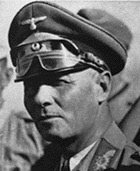
Field Marshall Erwin Rommel was one of the greatest military leaders, with exceptional moral and tactical abilities. He was regarded with fear and respect among both his troops and his opposition. Rommel gave prisoners the same amount of food, water, and medical treatment as he did his own men, as well as set fire to orders from Hitler to execute Rommelís prisoners.
Erwin Rommel was born in Heidenheim, Wurttemberg on November 15, 1891. He joined the 124th infantry regiment at age 21 as a cadet, and within two years had advanced to a second lieutenant and received his commission at the Danzig War Academy.
At the outbreak of World War One, Rommel was in the Danzig War Academy, and remained with there until late in 1916. Shortly after marrying Lucie Mollin, Rommel was called to the front lines. By the end of the war Rommel would earn the Pour le merite for his service on the French, Romanian, and Italian front lines.
After World War One, Rommel joined the Dresden Infantry School as an instructor. It was there that he wrote the book, Infantry Attacks. Not long after leaving the Dresden Infantry School, Rommel earned the rank of major.
In 1938 the recently appointed Colonel Rommel became commandant of the training facilities at Wiener Neustadt. Rommel would not remain long, because a new assignment was given to him. He was to take charge of protecting Adolf Hitler on his march into the Sudetenland and into Prague. He would also be in charge of protecting Hitler again on the night of the beginning of World War II, throughout the invasion of Poland. Afterwords, he would be promoted to major general, and re-assigned to the Seventh Panzer Division, which was responsible for the fall of France.
He changed command again, this time he would command an Infantry division in Libya. His service in Libya earned him the rank of Lieutenant General. Not long after he landed in Libya, he took off in his Heinkel He-111 to take pictures of Ďthe land which he was about to defendí. After nine months in Libya, Rommel was, once again, relocated. However he remained in the desert, just in Africa.
Once in Africa, Rommel took charge of the famous Afrika Corps, and in the June of 1942, with Rommel at the peak of his military career, he became the youngest Field Marshall in the entire German army, mostly because of his success in defending Cyrenaica from the invading British army and pushing them back as far Alamein, Egypt. With reinforcements from Hitler, the British army might have been driven from Africa altogether. However, Hitler never sent those necessary reinforcements. As a result, the British couldnít be driven off of Africa completely. Field Marshall Rommel, despite this lack of support from Hitler, had continued success until shortly after the Battle of Maedenine on May 5, 1943, when he became ill and was forced to return to Europe. There he would take command of Army Group B in northern Italy and eventually become the commander in chief in charge of the German forces in a large part of Europe.
While driving in the country in the spring of 1944, Rommelís vehicle was strafed by an allied aircraft, Rommel was seriously injured, and was sent home to recover.
On October 14, 1944, two generals arrived to investigate Rommel in a plot to kill Hitler. He was a suspect for several reasons. Rommel had never joined the Nazi party, or supported Hitler, and often attempted to dissuade Hitler from his persecution of the Jewish people. He also had begun to criticize Hitlerís actions more frequently, and even ignored orders from Hitler. Against Hitlerís orders, Field Marshall Rommel treated prisoners of war with as much respect as he did his own men, and when ordered to execute them, set fire to the order. Rommel also criticized Hitler for not sending reinforcements whenever Rommel had requested them.
When Rommel was arrested by the two generals, he was supposed to go to trial, but the generals offered a second option. Field Marshall Rommel could go to trial for treason, and risk death and his familyís honor; or the generals could give him a poison capsule which he was to take, and no matter what the outcome of his investigations, his family would receive pay and maintain their familyís honor. The Field Marshall chose to take the poison, and died on the way to his trial.
Despite his death, Field Marshall Erwin Rommel was a tactical genius, no matter what side you were fighting for, but his name wasnít spoken as much because he was undermanned and outgunned in his battle against the allies. However, against all odds, Field Marshall Rommel managed to prove that he was a formidable foe and a worthy ally.
One of Rommelís most famous battles was at Kolvorat Ridge during World War One where he took over nine thousand prisoners with only 150 men, 6 of which were killed with another 30 wounded, all in just over two days. Field Marshall Rommel also correctly predicted the location of the D-Day invasion site, Normandy, but his warning was ignored by Hitler, who sent the troops farther south to attack the troops that were supposedly landing there.
See a list of sources used in the making of this report
Total War Home Page
Back to the Total War Personalities page